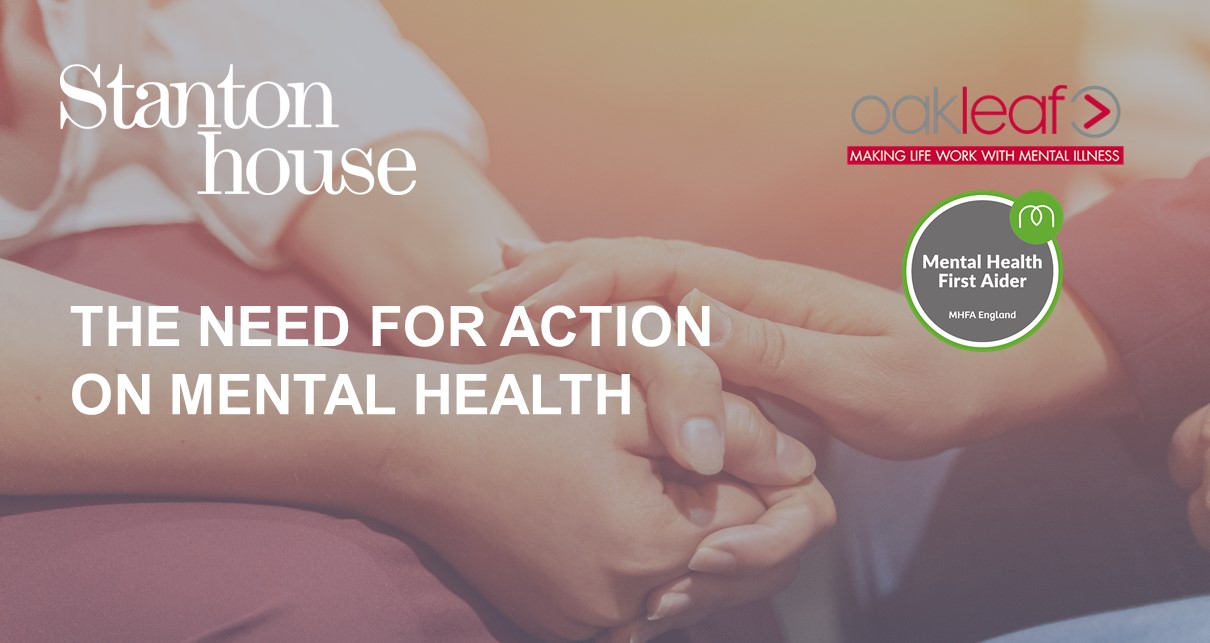

The impact of Covid-19 on mental health
Before Covid-19 emerged, global statistics on mental health conditions were already stark. According to the World Health Organisation (WHO):
- The global economy loses more than US$ 1 trillion per year due to depression and anxiety
- Depression affects 264 million people in the world
- People with severe mental conditions die 10-20 years earlier than the general population
- In low- and middle-income countries between 76% and 85% of people with mental health conditions receive no treatment for their condition, despite the evidence that effective interventions can be delivered in any resource context
- Globally there is less than 1 mental health professional for every 10,000 people
In England, one in four people will experience a mental health problem of some kind each year and one in six people report experiencing a common mental health problem (like anxiety, depression, eating disorders) in any given week. Let that sink in…
1 in 6.
And this stat from the charity Mind is pre-pandemic. The sad truth is that many people who previously coped well, are now less able to cope because of the multiple stressors generated by the pandemic. The long-term impact of the crisis on people’s mental health and in turn the mental health impact on society should not be overlooked.
Employers can and should play a vital role in reducing stigma and supporting individuals to maintain good mental health which facilitates their performance in their different roles at work, home, and society. In fact, I believe it is everyone’s responsibility.
What can you do as a manager?
My first personal experience of mental ill-health was seeing my dad have a complete nervous breakdown in his early forties. I don’t think I knew what was happening at the time, just that he was always so sad and couldn’t go to work. I think about it now more as an adult, than I think I ever probably registered it as a child.
Whilst he was lucky to receive great support from his company and through the NHS, I wish there had been more awareness of Mental Health issues so that he didn’t experience the shame that he felt because of his mental health illness. I do remember that part.
Most of us live at such a fast pace and it takes discipline to slow down and ‘be’ with people, really connecting and providing the space for people to open up and share.
“How are you?”
“Fine thanks, you?”
“No, really. How are you?”
“Not great, I don’t know why I feel like this”
“I feel numb”
“Is this it?”
“I don’t care”
“What’s the point?”
“I can’t do this”
“I’m not strong enough”
“I can’t cope”
“It’s too much”
“I don’t want to feel like this”
“I can’t breathe properly”
“I’m overwhelmed”
I cannot tell you how many times I have heard these or similar statements after asking ‘no really, how are you?’. Every time I do, I experience the same sense of responsibility overwhelm me to seek to support in the way that the person needs me to. Each time, I start from scratch and assume nothing. This is no different in a work or personal context. Gauging what someone else needs, not what you think they need, takes focused listening, care, empathy, and commitment.
My passion is people. I have spent the last decade of my career supporting people to develop personally and within the contexts of their organisations; to help them and their respective businesses to achieve their full potential. I’m wired to be with people and to support them. I think about how people are all the time. I probably have thousands of hours of coaching experience, privileged moments spent with people in an environment of trust, where people open up and share what their blockers are, what is holding them back, what is occupying their thinking and so on. We all have mental health in the same way that we have physical health, and like with our physical health, we can all experience mental ill-health and of course, this comes into the coaching environment.
As a Coach, establishing boundaries is a daily part of the coaching contract, and throughout my training, I was taught to assess when someone will benefit from a different intervention; professional therapeutic counselling perhaps and to clearly signpost when this is needed. But (and this is a big but) just being human is the best skill of all and there are no boundaries to care and the desire to support someone else. What is important is to have the knowledge to be able to support in the moment, and to be able to accurately signpost the best resources for the individual to be able to seek the right support.
You do not need to have a qualification to be there for people. You do not need to have all the answers and you should not let the fact that you are not a qualified Counsellor or Coach prevent you from reaching out to others and helping them work through their challenges.
It doesn’t matter how many conversations that I have with people that focus on mental health, I always feel naïve to their unique situation, and I never want to feel a different emotion - because it is just that - a unique situation. I could never have experienced supporting with someone’s unique challenge before, because every person’s feelings, thoughts and ultimately way forward is completely different than anything that I might have experienced previously. What is essential, I think, is that I remember that I am not here to solve the challenges that others experience, but to walk side-by-side with them, helping in the way that they need me to support. If you are unsure what I mean by this, watch ‘it’s not about the nail’ – this should give you a good guide!
Stanton House is on a Mental Health journey
I am so proud to work for a ‘human’ organisation and to actively work to reduce the stigma typically associated with Mental Health; to play a part in creating an environment where people care and where people can speak freely about how they feel, knowing that there is no judgement, only support. We are certainly not experts, but we are committed to being the best business that we can be in support of others in all ways, including their mental wellbeing.
We care deeply about everyone, and we are committed to supporting our 1 in 6 every day. Some of the practical ways that we are demonstrating this commitment include investing in mental health first aid training for employees through Oakleaf, and later this year we have Jen Clay of Oakleaf talking to our entire business about mental health and how we can better support each other and our friends and families. We have a focus group that meets regularly to continue to prioritise the mental health conversation. There is more that we can do, and we will – we’ve just started the very important journey that we are all on together.
We don’t know lots, but we don’t need to know everything because what we do know is that we can all connect and listen. We all have that human capacity and that is the start. It’s never easy, it is always important, and we all deserve the time and care.
Latest opportunities
£70000.00 - £90000.00 per annum
London
£70000.00 - £80000.00 per annum
London
Up to £70000.00 per annum
London
Similar blogs



.png)


